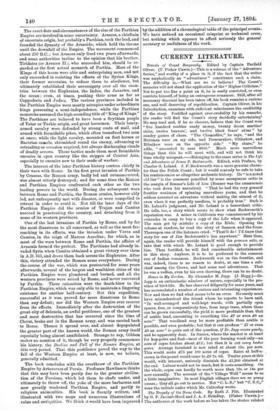CURRENT LITERATURE.
Travels of Count Benyowsky. Edited by Captain Parfield. Oliver. (T. Fisher Unwin.)—This is a volume of the " Adventure Series," and worthy of a place in it, if the fact that the writer was emphatically an " adventurer " constitutes such a claim. The difficulty is,—What are we to believe ? The Count's memoirs will not stand the application of the " Higher Criticism." Not to put too fine a point on it, he is easily convicted, or even convicts himself, of being an outrageous romancer. Still, after all necessary discount has been taken off, his book remains a curious one, and well deserving of republication. Captain Oliver, in his Introduction, examines with sufficient minuteness the credibility of the story. Fortified against over-credulity by his remarks, the reader will find the Count's story decidedly entertaining= He may read and, if he so chooses, believe that the Count won "five hundred roubles ready money, twenty dozen martins' skins, twelve beavers', and twelve black foxes' skins " by sundry games of chess. "The Chancellor," he says, "and the Hettman were on my side, and Proscurakow, Oltlaskow, and Ribnikow were on the opposite side." " My share," he adds, " amounted to near $800." Much more marvellous things than this he will meet with, and will not think his time wholly misspent.—Belonging to the same series is The Life and Adventures of James P. Beckwourth. Edited, with Preface, by Charles G. Leland. J. P. Beckwourth was a more genuine charac- ter than the Polish Count ; but it would scarcely be safe to take his reminiscences as altogether authentic history. He "is a noted old Tier" is the comment pencilled by some anonymous critic in the margin of Bonner's Life of him (Bonner was the amanuensis who took down his narrative). " That he had the very general frontier weakness of spinning marvellous yarns, and that he seldom narrated an adventure without making the utmost of it even when it was perfectly needless, is probably true." Such is Mr. Leland's judgment, and Mr. Leland is a benevolent critic. He tells, too, a story which seems to show what Beckwourth's reputation was. A miner in California was commissioned by his comrades in camp to buy a copy of the Life when it appeared. The man got by mistake a copy of the Bible. Opening the volume at random, he read the story of Samson and the foxes. Thereupon one of the listeners cried : " That'll do ! I'd know that story for one of Jim Beckwourth's lies anywhere." Here their, again, the reader will provide himself with the granum salis, or take that with which Mr. Leland is good enough to provide him. Thus fortified, he will find considerable entertainment in this story. Anyhow, it is to be preferred to the common run of Indian romances. Beckwourth was on the frontier, and was, indeed, there is no reason to doubt, at one time a sub.. chief among the Crows, and had some real adventures. That he was a ruffian, even by his own showing, there can be no doubt.
Hours in My Garden. By Alexander H. Tapp. (J. Hogg.)—Dr. Japp is an enthusiastic admirer of nature, especially in the pro- vince of bird-life. He has observed diligently for some years, and has accumulated a number of curious and interesting experiences. Now and then we find what seems to be an error. He surely must have misunderstood the friend whom he reports to have said, "In well-arranged and well-kept woods, with partially open spaces, free, or comparatively free, from large trees, where these can be grown successfully, the yield is more profitable than that of arable land, amounting to something like £7 or even £8 an acre." That woodland may be more profitable than arable is possible, and even probable; but that it can produce " .27 or even £8 an acre " is quite out of the question, if Dr. Japp means yearly, and he apparently does. In Sussex, where the market is at hand for hop-poles and fuel—most of the poor burning wood only—an acre of copse fetches about £12; but then it is cut every twelve years. Average farmland is now rated at about 15s. per acre. This would make £75 per 100 acres of copse. Rates at half-a- crown in the pound would come to £9 7s. 6d. Twelve years at this would, with interest, seriously diminish the £1,200 obtained at the end. Labour would not be much, but it costs something. On the whole, copse can hardly be worth more than 13s. or 14s. per acre annually. The account of the " Village Well " seems to us a little imaginative. In most English villages there are no young women; they all go out to service. Not "C. L. S.," but "C. S. C.," were the initials under which Mr. Calverley wrote.


















































 Previous page
Previous page